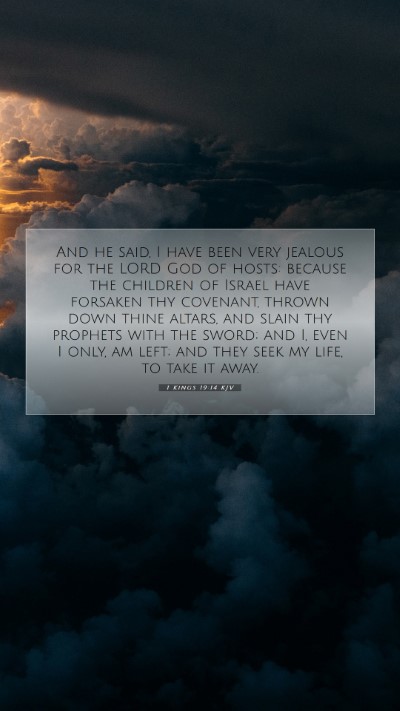Old Testament
Genesis Exodus Leviticus Numbers Deuteronomy Joshua Judges Ruth 1 Samuel 2 Samuel 1 Kings 2 Kings 1 Chronicles 2 Chronicles Ezra Nehemiah Esther Job Psalms Proverbs Ecclesiastes Song of Solomon Isaiah Jeremiah Lamentations Ezekiel Daniel Hosea Joel Amos Obadiah Jonah Micah Nahum Habakkuk Zephaniah Haggai Zechariah Malachi1 Kings 19:14 Meaning
What is the meaning of 1 Kings 19:14?
And he said, I have been very jealous for the LORD God of hosts: because the children of Israel have forsaken thy covenant, thrown down thine altars, and slain thy prophets with the sword; and I, even I only, am left; and they seek my life, to take it away.
1 Kings 19:14 Bible Verse Meaning
Understanding 1 Kings 19:14
Verse: "And he said, I have been very jealous for the LORD God of hosts; for the children of Israel have forsaken thy covenant, thrown down thine altars, and slain thy prophets with the sword; and I, even I only, am left; and they seek my life, to take it away." (1 Kings 19:14)
Summary of Meaning
This verse captures the profound despair experienced by the prophet Elijah after a confrontation with the idolatry and spiritual decline of Israel. Elijah’s declaration of being “very jealous” for the LORD underscores his zealous commitment to God and his covenant. However, he also reflects on the dire situation: Israel has not only abandoned God's laws but has also persecuted those who faithfully serve Him, including the prophets.
Contextual Analysis
The historical context is critical in understanding this passage. Following an intense confrontation with the prophets of Baal on Mount Carmel, where God demonstrated His sovereignty, Elijah fled into the wilderness fearing for his life after Queen Jezebel threatened him (1 Kings 19:2). This verse is part of Elijah’s complaint to God about the spiritual state of Israel and his feelings of isolation.
Key Insights from Commentaries
-
Matthew Henry's Commentary:
Henry emphasizes Elijah's deep concern for the glory of God and the wellbeing of His people. He notes Elijah’s feelings of isolation signify the broader apostasy within Israel and serves as a call for future restoration and revival.
-
Albert Barnes' Commentary:
Barnes interprets Elijah's sense of being the "only one left" as reflective of the overwhelming trials faced by God’s prophets. This sentiment indicates the absence of faithfulness in leadership and highlights God’s continued plan for His people, even through remnant believers.
-
Adam Clarke's Commentary:
Clarke focuses on the intensity of Elijah's feelings and the implications of his struggle. He underscores the divine assurance that follows and how God responds to Elijah’s vulnerability, demonstrating His ongoing providence and care for His chosen servants, even in their darkest moments.
Spiritual Lessons from the Passage
This verse offers several important spiritual lessons:
- The Burden of Zeal: Genuine concern for God’s glory and the state of His people can lead to feelings of isolation and despair when faced with widespread unfaithfulness.
- God’s Faithfulness to the Remnant: Even when circumstances seem dire and believers feel alone, God always preserves a remnant and has a plan for redemption.
- The Importance of Community: Elijah’s cry for help emphasizes the need for believers to support one another, particularly in times of spiritual crisis.
Cross References
- Romans 11:3-4: Paul's reference to the remnant of Israel, where God preserved a select group despite widespread apostasy.
- 1 Kings 18:22: Elijah’s confrontation with the false prophets, illustrating the conflict between idolatry and true worship.
- Isaiah 41:17-18: God's promise to provide for the needy and the distressed, affirming His attentiveness to those who cry out to Him.
Conclusion
In 1 Kings 19:14, Elijah’s lament reflects the trials faced by God’s faithful ones amidst a corrupt society. This verse serves to remind us of the significance of remaining steadfast in faith, understanding the emotional weight of spiritual leadership, and recognizing God's sovereign control over His people, even in the darkest times. Through biblical exegesis and scriptural analysis, believers can find insights and understanding that inform their faith journeys.
This analysis serves to enrich your Bible study insights and enhance your understanding of this critical moment in Scripture.


